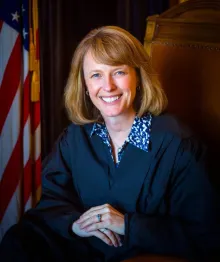CLEAR
Examining legal education and bar admissions to ensure competent and ethical practice.
State supreme courts must lead innovation & reform of legal education and admissions
The Committee on Legal Education and Admissions Reform (CLEAR) conducted extensive fact-finding research and outreach during an 18-month effort to better understand the changing legal profession and why it is not meeting the needs of the American people.
Released on July 30, 2025, the committee's eight key findings are based on 12 regional listening conferences around the country, over 90 interviews and focus groups of a wide range of stakeholders, and surveys of over 4,000 judges, 4,400 practicing attorneys, and 600 law students.
The Conference of Chief Justices and Conference of State Court Administrators report also calls for institutionalizing the work of CLEAR through the creation of a permanent, standing committee to support the implementation of its recommendations.
Support from the AccessLex Institute and Thomson Reuters Institute has made this work possible.
As the primary regulators of the legal profession in their respective jurisdictions, state supreme courts play a critical leadership role in ensuring that the public has access to competent legal representation.
New Hampshire Chief Justice Gordon J. MacDonald
CLEAR Chair

Recommendations for state supreme courts
Recommendation 1
Lead collaborative efforts to realign legal education, bar admissions and new lawyers' readiness to practice with public needs by fostering innovation and reform.
Recommendation 2
Implement state-level efforts to improve practice readiness by identifying and implementing specific strategies before and after lawyers are admitted to the practice of law.
Recommendation 3
Encourage law school accreditation that serves the public by promoting innovation, experimentation, and cost-effective legal education geared toward lawyers meeting the legal needs of the public.
Recommendation 4
Reduce reliance on external law school rankings.
Recommendation 5
Encourage experiential learning that involves client responsibility through clinics, internships, externships or other practice settings, and through licensing requirements established in collaboration with legal educators.
Recommendation 6
Reform bar admissions processes to better meet public needs by exploring innovative pathways to licensure that enhance practice readiness and address access to justice.
Recommendation 7
Support public service attorneys by championing public interest lawyering and by engaging prospective and enrolled law students about the financial and professional implications of law school.
Recommendation 8
Encourage rural practice by expanding opportunities for cost-effective rural education by promoting distance learning, exploring innovative pathways designed to address rural legal needs, and encouraging internship, externship, and law clerkships.
Explore more about CLEAR
We've developed a variety of communications that further explain our work and its important impact on legal education and bar admissions.
The urgent need for reform
Insights from more than 4,000 judges who responded to an online survey about preparedness of attorneys within their first five years of practice.
agree or strongly agree that further training is needed before appearing in court.
agree or strongly agree that unprepared attorneys have negatively affected client advocacy.
sometimes, rarely, or never find new lawyers appropriately applying the rules of evidence.
The recommendations outlined in this report offer a roadmap for how state courts can lead in advancing the profession and ensuring that access to justice for all is a reality.
New Mexico Justice C. Shannon Bacon
CLEAR Vice-Chair

Connect with us
Have ideas about how state courts can improve legal education and licensure practices and processes to ensure access to competent legal representation? Interested in learning more about CLEAR and providing opportunities to spread the word? We're here to help.
Understanding public perception of courts
Our annual State of the State Courts public opinion poll assesses confidence in state courts, emerging trends, and opportunities for judicial innovation. This year's survey gauged sentiment on topics related to access and fairness, AI, judicial security, and legal education.










